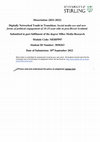Papers by Malini Chakrabarty

I would like to take this opportunity to express my deep sense of gratitude to all the people wit... more I would like to take this opportunity to express my deep sense of gratitude to all the people without whom this research study could have never been possible. First and foremost, I would like to thank my parents for their inexhaustible support and inspiration. Thank you for never letting a patriarchal society tell you how daughters should be raised and succumbing to cruel conformity. I want to thank my late grandmother, who had a dream of being where I am today, but she had to survive a genocide, a famine and fight misogyny. Thank god she persisted. I aim to be her wildest dreams come alive. I want to thank my older sister who I'll give up my literal organs for, but not share my chocolates with. I would love to thank my friends for adopting this introvert. Their incredible support, great conversations and their choice of music, books, films and memes is essentially the reason I'm alive today. I would like to extend my sincere gratitude to my supervisor, Dr. Dinan who went above and beyond to guide me through this academic journey and made me realise that constructive criticism in rooted in growth. His patience, intelligence, wit and humility inspire me to keep working on my myself every day. Thank you for helping me grow, Professor. You changed my life and I'm grateful to be your student. I hope someday I can carry your kindness forward. I would like to thank my amazing partner, Scott, who has been my rock of support through sunny and stormy days of life teaching me what love truly feels like. I want to thank my wee fur babies Snowy and Ciana for always being their beautiful selves and filling up my heart with joy and love even when they are miles away. Last but not the least, I would like to thank the person who discovered tea.
Thesis Chapters by Malini Chakrabarty

The departure of the United Kingdom from the European Union, also known as Brexit, in 2020 follow... more The departure of the United Kingdom from the European Union, also known as Brexit, in 2020 followed the referendum of 2016, leaving a sense that Scotland’s voice was being ignored since 62% of Scots voted to remain in the Brexit referendum. Currently, in 2022, there has been a growing demand for the need for a second Scottish independence referendum spearheaded by the Scottish National Party (SNP), and a second referendum has been proposed for 2023. In the context of this dynamic socio-political climate, this study investigates how young adults aged 18 to 25 years of age in Scotland use social media applications to engage in politics and political discussion. The number of political discussions that occur online, particularly on apps like Tiktok and Instagram, has arguably surpassed traditional forms of political engagement (Poell,2021.) For younger voters, their identity extends radically into the digital space, and this study further aims to study what "politics" means for young adults in Scotland, which particular social media applications they use for political engagement, and how they engage politically through their chosen social media applications.
This study would further compare existing research findings with traditional forms of political engagement with the aim of unravelling how transitions in forms of political communication are taking place in contemporary Scotland. Initially, an online survey was conducted to learn more about which social media platforms our target audience used most frequently and whether they participated in any online or offline political activity. This survey was followed up by a semi-structured virtual interview where the participants were asked to elaborate on their perception of politics, the role of social media in their lives, and how they use social media applications to engage in politics. In this study, we focus on a subset of the population known as "The Digitally Networked Youth," a term adapted from "the networked young citizen" (Rainie & Wellman, 2012), who argued that people's interpersonal relationships are increasingly mediated by online social networks. In this study, we investigate their theory in the context of Scottish youth aged 18–25 years in post-Brexit Scotland in 2022. The study findings pave the way for further academic research into changing forms of political communication targeted at youth while informing media, social and public policies and even marketing campaigns.
Uploads
Papers by Malini Chakrabarty
Thesis Chapters by Malini Chakrabarty
This study would further compare existing research findings with traditional forms of political engagement with the aim of unravelling how transitions in forms of political communication are taking place in contemporary Scotland. Initially, an online survey was conducted to learn more about which social media platforms our target audience used most frequently and whether they participated in any online or offline political activity. This survey was followed up by a semi-structured virtual interview where the participants were asked to elaborate on their perception of politics, the role of social media in their lives, and how they use social media applications to engage in politics. In this study, we focus on a subset of the population known as "The Digitally Networked Youth," a term adapted from "the networked young citizen" (Rainie & Wellman, 2012), who argued that people's interpersonal relationships are increasingly mediated by online social networks. In this study, we investigate their theory in the context of Scottish youth aged 18–25 years in post-Brexit Scotland in 2022. The study findings pave the way for further academic research into changing forms of political communication targeted at youth while informing media, social and public policies and even marketing campaigns.
This study would further compare existing research findings with traditional forms of political engagement with the aim of unravelling how transitions in forms of political communication are taking place in contemporary Scotland. Initially, an online survey was conducted to learn more about which social media platforms our target audience used most frequently and whether they participated in any online or offline political activity. This survey was followed up by a semi-structured virtual interview where the participants were asked to elaborate on their perception of politics, the role of social media in their lives, and how they use social media applications to engage in politics. In this study, we focus on a subset of the population known as "The Digitally Networked Youth," a term adapted from "the networked young citizen" (Rainie & Wellman, 2012), who argued that people's interpersonal relationships are increasingly mediated by online social networks. In this study, we investigate their theory in the context of Scottish youth aged 18–25 years in post-Brexit Scotland in 2022. The study findings pave the way for further academic research into changing forms of political communication targeted at youth while informing media, social and public policies and even marketing campaigns.